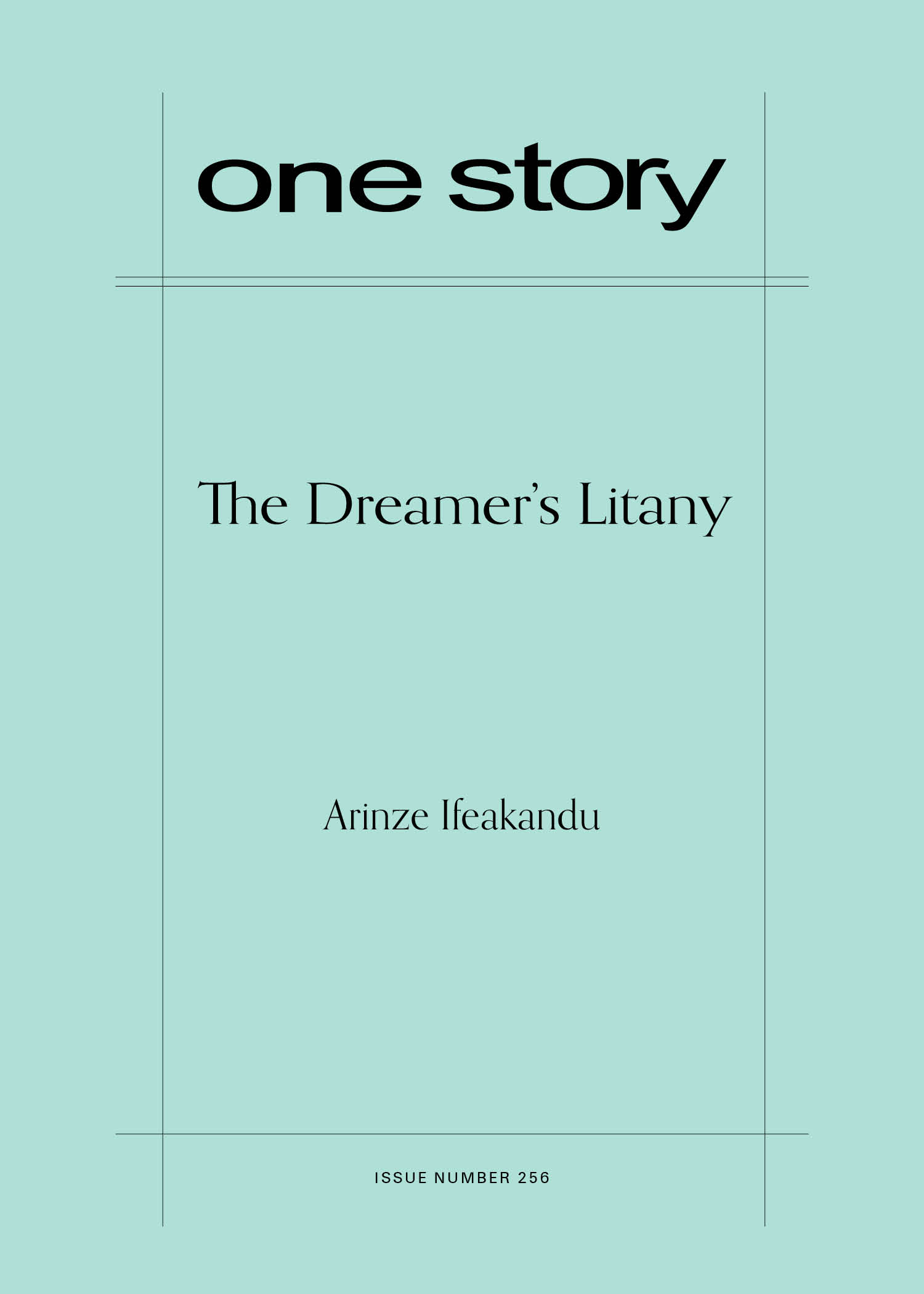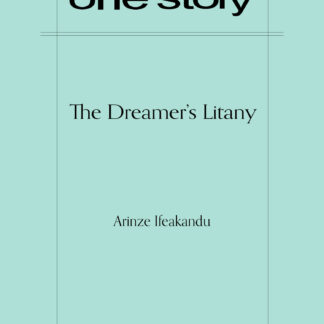
The Dreamer’s Litany
$2.50
64 in stock
Excerpt
On a warm Saturday night full of starlight, Chief walked into Auwal’s shop and asked for a recharge card. “Scratch it for me,” he said to Auwal, and then took his time tapping in the numbers. He sat down on a bench outside the shop, asked for a bottle of Star. “Sorry, sir,”Auwal said. “We no sell alcohol, sir.” And Chief chuckled and muttered something, his gaze roving around Auwal’s face, seeking his eyes. Auwal looked away. The man made him uncomfortable; it was something about his stare, at once coy and aggressive. Auwal had moved to Brigade from a village two hours away, a village of greenery that stretched all the way, so that on the horizon land and sky became one bluey-green parchment, and yet when Chief asked where he came from, he said, “Cotonou,” and hoped that his desperate attempts at English would bore the man.
“Cotonou, Cotonou.” The man looked clueless, a cluelessness that was amusing to watch, contorted as it was under the camouflage of reflection. “Cotonou, them no dey speak English?”
Auwal shook his head. “No, no. Français. Comprenez-vous le Français?”
“Ah! No sell me with French oh!” The man had a shrill giggle, and the way his hands fluttered to his lips, light and delicate, the rapid blinking of his eyes: Auwal thought of Idris, then, lithe, fragile Idris with eyes like small pearly nuts.
“I no fit sell you, fa.” Auwal laughed. “French, good. Fine language.”
“French sexy, I lie?”
Arinze Ifeakandu
Arinze Ifeakandu was shortlisted for the Caine Prize in 2017 for his short story, “God’s Children are Little Broken Things” and was an Emerging Writer fellow at A Public Space in 2015. He is currently an MFA candidate at the Iowa Writers’ Workshop. His stories have appeared in A Public Space and in the Caine Prize anthologies, among other places. He has recently completed a collection of stories.
Patrick Ryan on “The Dreamer’s Litany”
Our new issue, “The Dreamer’s Litany,” reaches for an answer to a very difficult question: What happens when the heart cannot have what it desires?
Auwal is a struggling shopkeeper with a wife, a daughter, and a dream of a better life. When he meets the gregarious Chief, he sees a man who might be able to help them. But Chief wants something in return—something he intuits Auwal might be able to provide no matter how reluctant he is. As their lives begin to overlap more and more, the complexities of their less-than-ideal arrangement grow. Auwal is no stranger to hardship, nor is he a stranger to a broken heart. He wants to do well, do better. But is Chief a path toward betterment, or a fast track in the opposite direction?
One Story is thrilled to be publishing Arinze Ifeakandu, a young writer who was one of A Public Space’s Emerging Writer fellows and a finalist for the Caine Prize. “The Dreamer’s Litany” is a tense and fractured love story full of unexpected twists and turns that often take place away from home, after the sun goes down. As the author says in our Q&A, “At night, people will surprise you, surprise even themselves.”
Q&A by Patrick Ryan
- PR: Where did the idea for this story come from?
- AI: For most of the stories I write, there is a muse, a person whose way of speaking, smiling, being, inspires a character. For this story, that person was a shopkeeper who I met when visiting family in Abuja. I was always home alone, and bored, and would sometimes go sit with him and chat. He spoke French, wasn’t originally from Nigeria. I’d had the title “The Dreamer’s Litany” for months, maybe a year, and knew I wanted to write about a man who had dreams of bettering the living condition of his family, but the character did not form in my imagination, no matter how hard I tried. Auwal’s voice came eventually after I began talking to the shopkeeper, and I wrote the first scene quickly.
- PR: At any point during the writing, did you consider broadening the perspective/point-of-view to include Chief, Maryam, even Idris? Or was the plan always to keep the perspective tethered to Auwal?
- AI: I did think of including Chief’s perspective, but only in the beginning. I imagined that I would go back and forth between both characters, filling up Chief’s backstory the way I did Auwal’s. As the story progressed, however, I realized that it wanted to stay with Auwal, which meant that occasionally I was tempted to expand Maryam’s presence, not in a separate point-of-view: the temptation was to put her in more positions of conflict with Auwal, to have him think of their relationship, its history and its present state, in ways that would help us see her more exhaustively. It was only a temptation, though—it would have distracted from the central conflict of the story, I think, especially in a short story, with its limitations of space.
- PR: How long did it take you to complete this story?
- AI: I wrote the first draft in a month, if you were to subtract the weeks I spent fretting over it, not writing. After that, I sent it out to a few friends, as I always do, taking on their feedback. With this story, I did not have to do many drafts. All I had to do after that first draft was to add scenes, take out sentences, write new ones, and so on. I continued to add new things—a sentence here, a scene there—even after I had sent it out, as you already know, haha.
- PR: Were there any surprises during the writing? Another way I sometimes ask this question is, How different is the finished story from the one you originally envisioned?
- AI: I don’t really recall any huge surprises. There’s a scene, though, small, which came as a shock to me. Auwal has just come home from being with Chief, and Maryam confronts him at the door. What he does next, I did not intend for his character to be that kind of man, and in a strict sense maybe he isn’t, because he is shocked, as I was at the time of writing it. But it seemed absolutely necessary, considering everything else.
- PR: In the world of the story, how common are relationships like the one that forms between Auwal and Chief?
- AI: There are two things here, the first being that this is a secret relationship between two men. Depending on who is looking, I do not think that this is rare. Closeted “family men” abound wherever homophobia exists. What I think is uncommon is the inter-ethnic nature of the relationship, specifically because Chief is not an app-using millennial. There is a scene in which Auwal thinks that Hausa is, for Chief, a language for business and not one of tenderness. For an Igbo man of Chief’s age, any form of relationship with Auwal would most likely involve business, colored with a friendliness that rarely goes deep. At least that is what we see in the light of day. At night, people will surprise you, surprise even themselves. That was part of the thrill, for me, in writing these characters, that I was chasing something I knew existed but very rarely saw openly.
- PR: Do you consider Chief to be a sympathetic character or a villain (or both)?
- AI: An editor considering this story told me that Chief was too obvious in the way he telegraphed his moves, and even though I agreed with their other comments and incorporated them, I disagreed with that very point. I think it is a very American thing, for a powerful man to assert himself obliquely. Chief is a very familiar character, rich, entitled and uninterested in subtlety or politeness. He can be good when he chooses, but he knows his power and is ruthless in wielding it to get what he wants. To deal with a man like that, you have to be sporadically inaccessible, haughty even (like Chima), and Auwal does not understand this, too good as he is for games.
- PR: Have you given any thought to writing more stories that feature Auwal?
- AI: Now that you mention it... I know that I’d definitely enjoy writing his teenage years. I’m still occasionally curious about that, his childhood, and Idris, and his mother.
- PR: Finish this sentence in just one word—the word you think best captures it: “This story is about __________.”?
- AI: Longing.
- PR: What are you working on now?
- AI: I have completed my short story collection. I am eternally revising, adding things when I feel the need to. Recently, I started work on something I think will be a novel.
- PR: What is the best bit of advice about writing you have ever received?
- AI: I was attending Chimamanda Ngozi Adichie’s writing workshop years ago—in 2012/2013, I think—and one of the writing prompts was to write a short piece showing a family’s relationship. I wrote this very abusive man who beat the house-help, and who was mean and terribly sexist. Chimamanda said, “He does not feel real to me,” something along those lines, and then told me that even the most horrible people have something they care about, and that the kindest people can sometimes act cruelly. That has stayed with me.
